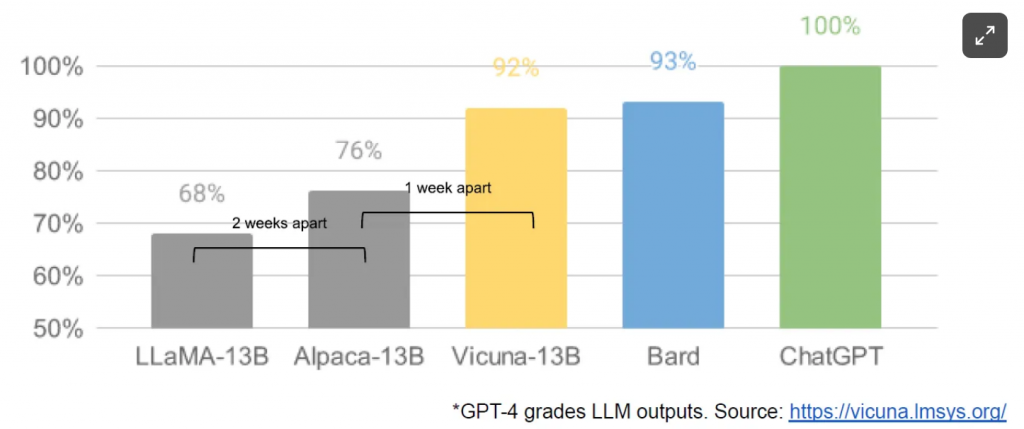
At this point, LLaMA is not instruction or conversation tuned. Like many current models, it is a relatively small model (available at 7B, 13B, 33B, and 65B parameters) that has been trained for a relatively large amount of time and is therefore quite capable relative to its size. Llama 2 has even more open-source capabilities
Leaked Google Memo Describes Popularity of Meta’s Llama with Developers
While it may have been just a lucky break or a well-planned business maneuver, it certainly was a good move for Meta. The company, founded by CEO Mark Zuckerburg, created Llama, a free large language model that developers have embraced.
A story on wired.com describes how Meta sought to compete with OpenAI’s ChatGPT—with a program offered for free.
“In May, an anonymous memo written by a Google researcher concerned about the company’s future leaked information about the app online. It argued that, while executives squabbled about the competitive threat of text-generation technology from OpenAI, open-source software was ‘quietly eating our lunch.'”
Llama was initially available by invitation, but after researchers leaked it on 4Chan, it took off with programmers. Within weeks of its release, Alpaca and Vicuna variants were almost as efficient as ChatGPT.
“The impact on the community cannot be overstated,” the leaked Google memo said. “Suddenly anyone can experiment.”
Llama 2 Is Loaded
The folks at Meta saw an opportunity with Llama and ran with it. Recently, the company released an open-source, free version of Llama 2 to users. The new version used 40 percent more data than the original, and a chatbot built on the model is comparable to OpenAI’s ChatGPT, according to Meta. Spectrum.ieee.org says a Meta paper introducing the bot said it was comparable to ChatGPT 3.5 in academic benchmarks.
Meta’s system is the only one available for free to developers. With its cheaper or free option, Meta’s Llama 2 makes it easier for small companies or lone coders to create new products and services, potentially accelerating the current AI boom.
A Crossover Hit
When a song is popular on a rock radio station and a country station simultaneously, it’s called a crossover hit. Songs like “Whole Lotta Shaking Going On” by Jerry Lee Lewis were among the first to be played by multiple radio station genres. It doesn’t happen often, but when it does it increases the revenue produced by that song. It looks like Meta’s Llama 2 is going to be a successful crossover for a range of developers, and for small to large companies.
Even Microsoft, which invested heavily in Open AI, plans to offer Llama 2 downloads to developers for use in the cloud or on Windows. At a conference for Microsoft customers last week, CEO Satya Nadella said the company wants developers to be able to use Meta’s open-source AI alongside the proprietary offerings of OpenAI. Amazon’s cloud division, AWS, also offers access to Llama 2.
Restrictions
While Meta appears to be advancing AI with the release of Llama 2, its program has potential drawbacks. The training data used to create the model is described in release materials only as “publicly available online sources,” and the company won’t offer further details about what went into the model’s creation.
Meta’s license for Llama 2 also requires companies with more than 700 million monthly active users to establish a separate license agreement with Meta. It is not clear why, but the clause creates a barrier to other tech giants building on the system. The model also comes with an acceptable use policy, which prohibits generating malicious code, promoting violence, or enabling criminal activity, abuse, or harassment.
read more at wired.com







Leave A Comment